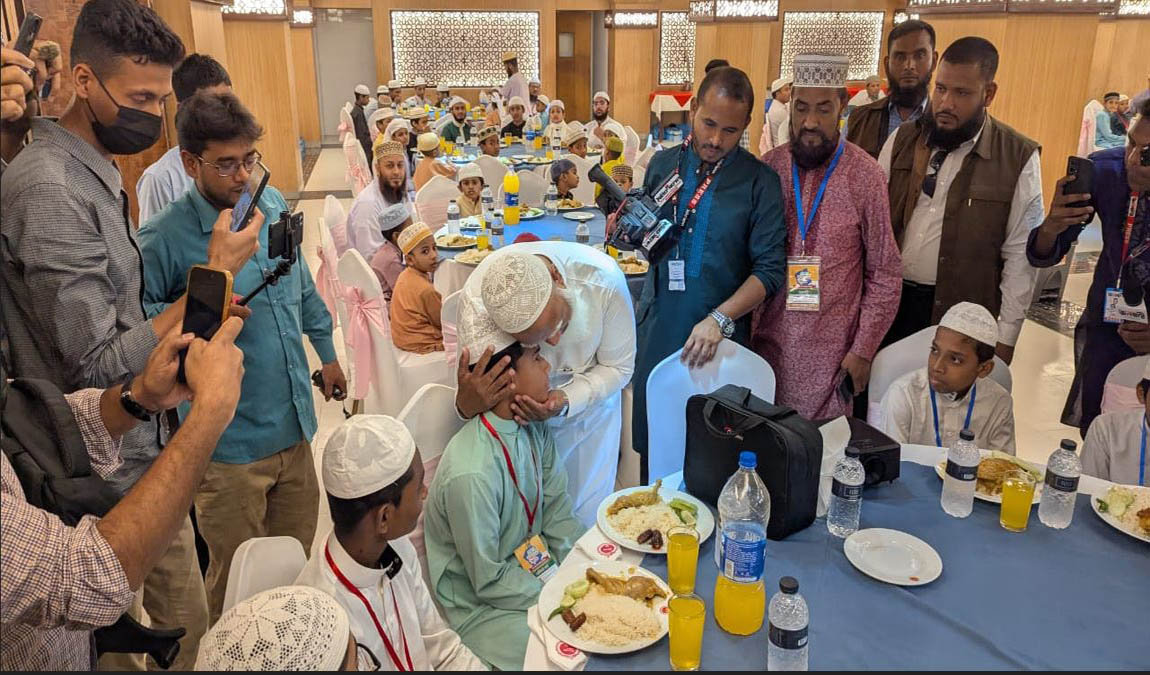Bangladesh Jamaat-e-Islami’s Ameer, Dr. Shafiqur Rahman, stated that both scholars and students of Islamic knowledge are blessed with glad tidings. He cited a hadith of the Prophet Muhammad (PBUH), which says: “The best among you is the one who learns the Qur'an and teaches it to others.” He expressed pride in meeting with them and called upon the country’s scholars to play a historic role in the welfare of the nation, people, and Islam.
He made these remarks as the chief guest at an Iftar gathering organized by Bangladesh Jamaat-e-Islami’s Dhaka City North, in honor of scholars and orphans of the Dhaka-15 constituency. The event was held at Grand Prince Chinese Restaurant in Mirpur-14, Dhaka.
The event was presided over by Central Executive Council member and Dhaka North City Ameer Mohammad Selim Uddin. It was hosted by Central Working Committee member and Secretary of Dhaka City North Jamaat’s Dr. Muhammad Rezaul Karim. Among the attendees were Central Working Committee member and Nayeb-e-Ameer of Dhaka City North, Abdur Rahman Musa, Engineer Golam Mostafa, Central Majlis-e-Shura members and Assistant Secretaries of Dhaka City North Jamaat Mahfuzur Rahman, Najim Uddin Molla, Dr. Fakhruddin Manik, and Yasin Arafat.

Dr. Shafiqur Rahman stated that Islam is the ultimate purpose of life. The more Islamic education spreads in the country, the more enlightened society will become. Conversely, a decline in Islamic education will lead to darkness. He pointed to the nearly 16 years of misrule by the fallen Awami League as an example. During this period, he claimed, respected scholars were unjustly imprisoned and subjected to severe torture. They were shackled, while criminals and anti-social elements roamed freely across the country.
Recalling his own arrest, he said, “I was arrested in the dead of night. Though I was not kept in an Aaina Ghar, I saw everything. I was arrested in such a way as if I were a dangerous criminal. After spending a few days in Keraniganj prison, I, along with 38 other distinguished scholars, was transferred to Kashimpur High-Security Prison. Seeing that everyone except me was handcuffed and shackled, I cried. But Allah provided us with a comforting environment.” He urged the country’s scholars to build a greater unity to move the nation forward.
Jamaat Ameer said that the holy month of Ramadan is a time for forgiveness and absolution of sins. Fasting, in essence, burns away a person's sins. The Prophet Muhammad (PBUH) mentioned in a hadith that one day he said "Ameen" three times consecutively. The companions asked, "O Messenger of Allah (PBUH), you have never done this before." In response, the Prophet (PBUH) said, "Jibreel (A) came to me and said: ‘May that person be ruined who experiences the month of Ramadan but fails to have his sins forgiven.’ I said: ‘Ameen.’ Then he said: ‘May that person be ruined who finds his parents, or even one of them, in old age but fails to attain Paradise by serving them.’ I said: ‘Ameen.’ Then Jibreel said: ‘May that person be ruined who hears your name and does not send blessings upon you.’ I said: ‘Ameen.’”
Therefore, he emphasized that everyone must properly observe fasting (Sawm) and night prayers (Qiyam) during Ramadan for both worldly well-being and salvation in the hereafter.
Jamaat Ameer further stated that although this country has a Muslim majority, people of various religions also live here, and they are all citizens of Bangladesh. As human beings, it is our duty to work for the welfare of all. He mentioned that through the successful movement of students and the public, a new Bangladesh was achieved. He also remarked that while many revolutionary promises were made, not even one percent of them materialized. Whatever little was achieved was politically motivated, and Jamaat does not support such partial gains. He firmly asserted that there is no place for discrimination in this country. Finally, he called on everyone to unite on a single platform to build a new Bangladesh free from hunger, poverty, and inequality.
